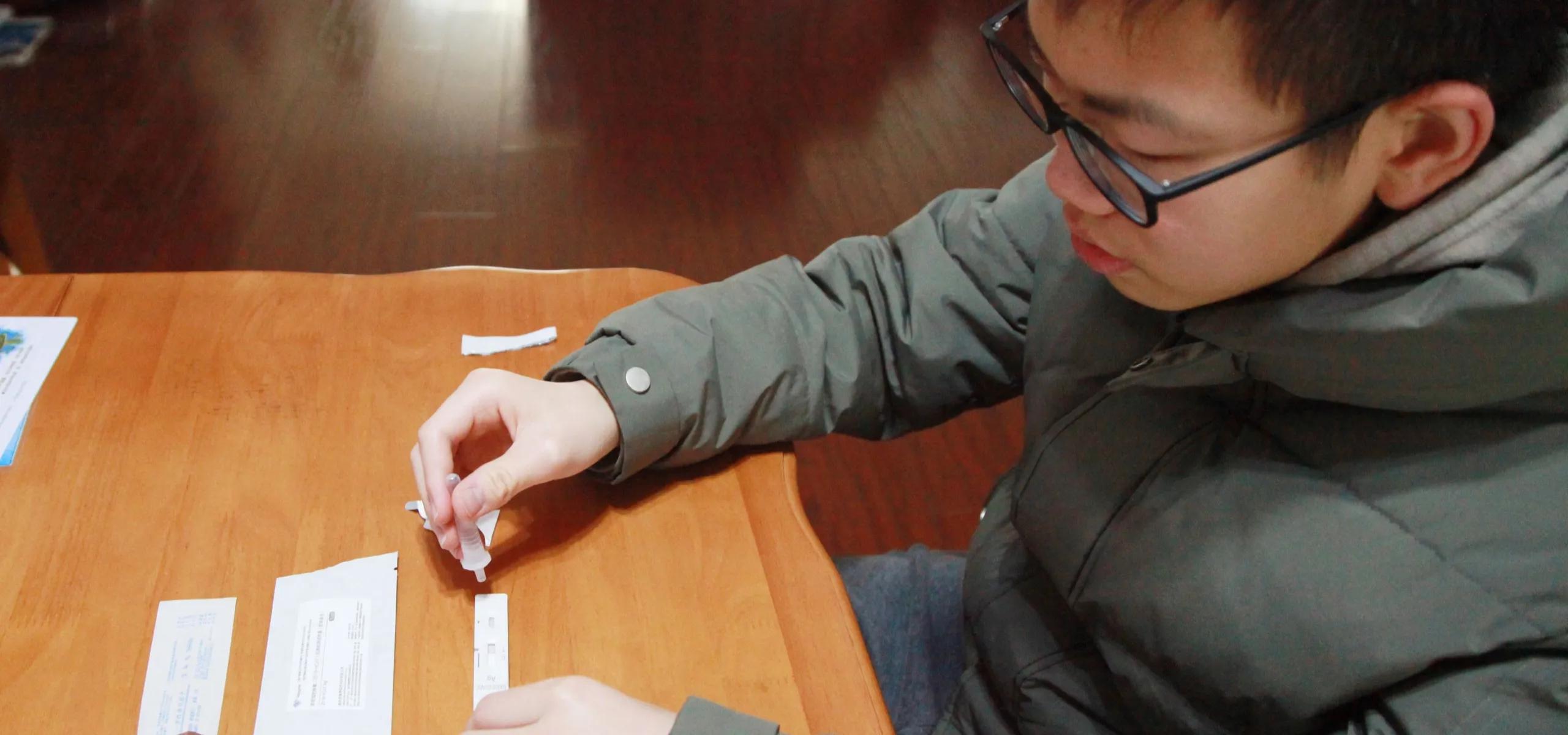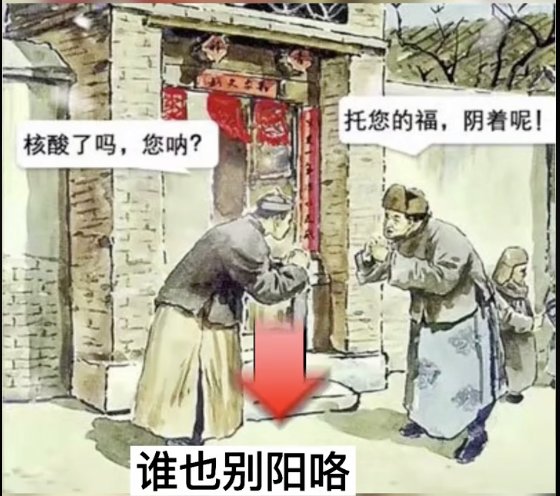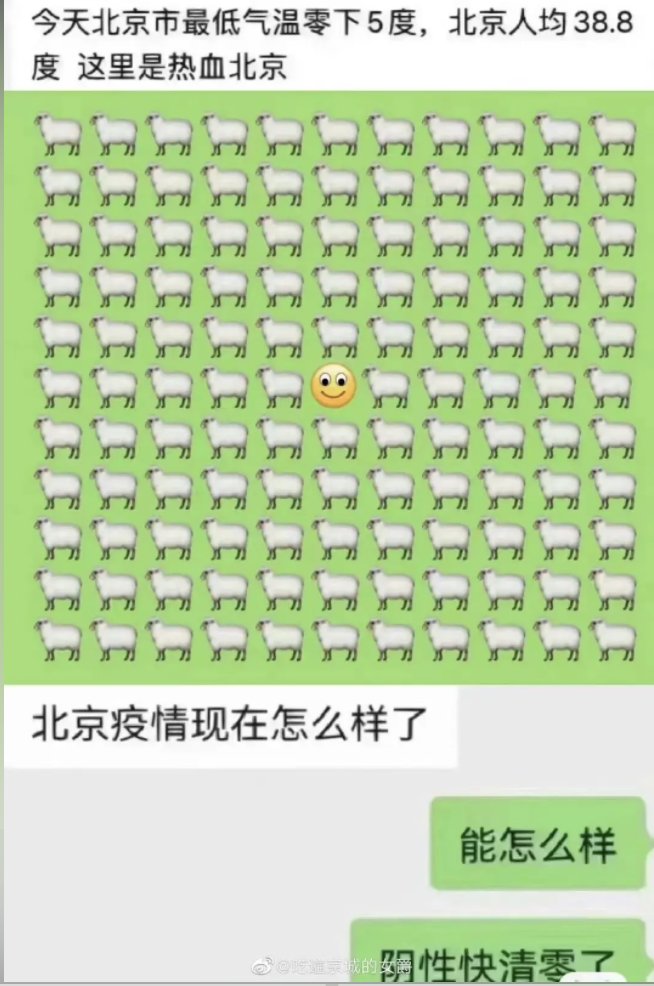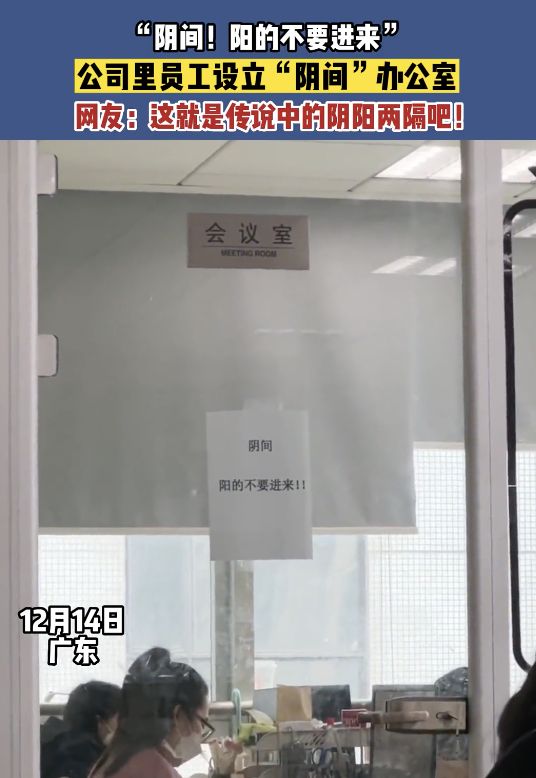The Chinese internet has exploded with people sharing their positive Covid-19 tests, and joking about what to do next
Since China pivoted away from its “dynamic zero-Covid (动态清零 dòngtài qīnglíng)” policies, the current Omicron variant has caused a surge of infections. As many cities, including the capital Beijing, are in the midst of a spike in cases, netizens (some already sick at home) have also generated reams of new slang terms, hoping to console their infected friends and cheer up the lucky ones who remain healthy.
During China’s zero-Covid era, a crucial life-saving strategy for citizens was “storing vegetables (囤菜 túncài)” in case of unexpected lockdown. However, as infection now seems inevitable, residents immediately shifted gear...but not by much. ”Before: We store vegetables and wait for lockdowns. Now: We stockpile medicine and wait for fever. (以前: 买菜等封控。现在: 买药等发烧。Yǐqián: mǎicài děng fēngkòng. Xiànzài: mǎiyào děng fāshāo.)”
Overnight, Beijing saw long lines spring up outside pharmacies. Anxious residents rushed to drugstores or shopped online to store medicine and antigen test kits. Cold and fever medicines were soon out of stock, and countless reports started mushrooming around the city of people who tested positive, known as “little positive people (小阳人 xiǎoyángrén)” or “sheep (羊 yáng),” since the word for “sheep” sounds the same as “positive (阳性 yángxìng).”
Netizens quipped online: ”There have been a large number of Covid infections in Beijing. If you don’t know any positive patients, please reflect on your social skills (北京已经有大量的感染,如果你一个阳性患者都不认识,请检讨一下你的社交能力 Běijīng yǐjīng yǒu dàliàng de gǎnrǎn, rúguǒ nǐ yí gè yángxìng huànzhě dōu bú rènshi, qǐng jiǎntǎo yíxià nǐ de shèjiāo nénglì).”
They also created plenty of jokes related to the test result: Terms for “negative (阴 yīn)” and “positive (阳 yáng)” are based on the traditional Chinese philosophical concept of yin and yang. People’s WeChat social feeds were soon full of Covid patients posting their antigen test results, symptoms, and feelings. Netizens awed: “My WeChat Moments is full of yang qi (朋友圈阳气好足, Péngyǒuquān yángqì hǎo zú).”
They even joked: “What is the first symptom when people get Covid? For 99 percent of them it would be sharing it on WeChat Moments. (阳了以后的首发症状是什么?99%都是先发朋友圈 Yángle yǐhòu de shǒufā zhèngzhuàng shì shénme? Bǎi fēnzhī jiǔshí jiǔ dōushì xiān fā péngyǒuquān).”
Beijing residents’ daily greeting has also changed from “Have you eaten (吃了吗您 Chī le ma nín)?” to “Have you done your Covid test (核酸了吗您 Hésuān le ma nín),” and now it became: “Have you tested positive (阳了吗您 Yáng le ma nín)?”
If somebody asks them: “How is Beijing’s pandemic situation? (北京现在疫情怎么样? Běijīng xiànzài yìqíng zěnmeyàng?)” They might answer: “Very well, we are nearly approaching zero-negative (挺好的,阴性快清零了 Tǐng hǎo de, yīnxìng kuài qīnglíng le).”
It was reassuring to see residents still keep an optimistic attitude amid fever and freezing weather. They announced on the internet: “Today, the lowest temperature in Beijing is minus 7 degrees, but the average temperature of Beijingers is 38.8 degrees. Welcome to hot-blooded Beijing. (今天北京市最低气温零下7度,北京人均38.8度,这里是热血北京。Jīntiān Běijīng Shì zuì dī qìwēn líng xià qī dù, Běijīng rénjūn sānshí diǎn bā dù, zhèli shì rèxuè Běijīng.)”
Some companies started to isolate positive workers. Netizens made fun of the practice by playing on the words 阴间 (yīnjiān) and 阳间 (yángjiān), which normally refer to the underworld and the mortal world: “In my office, workers are separated. One side is the underworld (for negative people), and the other is the upper world (for positive cases)—again, a play on words due to similar sounds. (在我们办公室,员工分开办公。一边是阴间,一边是阳间。Zài wǒmen bàngōngshì, yuángōng fēnkāi bàngōng. Yìbiān shì yīnjiān, yìbiān shì yángjiān.)” This time, however, “underworld” is where you want to be.
Several innocent celebrities and fictional characters also regained heated discussion recently, simply because the pronunciation of their names was relevant to yang. People subjected the name of the actor Jackson Yee (易烊千玺 Yì Yángqiānxǐ) to jokes: “Is the Spring Festival travel rush this year like a hundred million migrating positive people? (今年春运是不是亿阳迁徙 Jīnnián chūnyùn shì bú shì yì yáng qiānxǐ).”
Yang Di (杨迪 Yáng Dí), a host and actor, also found himself becoming an online meme. His name is pronounced the same as “阳敌 (yáng dí),” literally meaning “the enemy of being positive.” Yang’s picture thus was reposted in almost every corner of the internet, and even pasted on people’s office desks, with the caption, “Repost this Yang Di (enemy of being positive), and you can always stay negative (转发这个杨迪 (阳敌),就可以一直阴性 Zhuǎnfā zhège Yáng Dí, jiù kěyǐ yìzhí yīnxìng).”
Yang Guo (杨过 Yáng Guò), the fictional protagonist of the renowned wuxia novel The Return of the Condor Heroes (《神雕侠侣》) by Jin Yong (whose real name was Zha Liangyong), has gained popularity again lately, since his name is a homephone for “阳过 (yángguò),” meaning someone who has already tested positive (and presumably will soon recover).
As Yang Guo was honored as Condor Hero in the novel, netizens joked: “In a few days, Beijing will be full of Condor Heros on the street. (再过十天半个月,北京满大街就都是神雕大侠了 Zài guò shí tiān bàn gè yuè, Běijīng mǎn dàjiē jiù dōushì Shéndiāo Dàxiá le).”
A WeChat game called “Sheep a Sheep (羊了个羊 Yáng Le Gè Yáng),” which went viral two months ago, is also now embedded with a new meaning. The game is full of tiles drawn with sheep, and players must eliminate tiles of the same category in groups of three to win and join a virtual herd. As yang acquaintances spring up around them, negative people start to wonder: “When am I able to join the herd (我什么时候加入羊群 Wǒ shénme shíhòu jiārù yángqún)?”
Some, tired of the waiting game, even wish they can get infected soon: “It feels like everyone has taken an exam, but I am still reviewing for it. Some say it is difficult, and some say easy. The more I prepare, the more nervous I get. I don’t know when I will be called to take the exam. (大家都去考试了,我还在这复习呢。有人说题难,有人说题简单。我越复习越紧张,也不知道啥时候叫我去考试。Dàjiā dōu qù kǎoshì le, wǒ hái zài zhè fùxí ne. Yǒu rén shuō tí nán, yǒu rén shuō tí jiǎndān. Wǒ yuè fùxí yuè jǐnzhāng, yě bù zhīdào shá shíhòu jiào wǒ qù kǎoshì.)”
The remaining negative Beijing residents now “kept asking themselves three daily questions: ”When will I be positive? Will I feel sick when I get positive? Have I already been positive (and asymptomatic)? (我每天就三个问题打转:我什么时候阳?我阳了会难受吗?是不是我已经阳过了?Wǒ měi tiān jiù sān gè wèntí dǎzhuàn: Wǒ shénme shíhòu yáng? Wǒ yángle huì nánshòu ma? Shì bú shì wǒ yǐjīng yángguò le?)”
They sigh online: “The atmosphere has been hyped up so much, it would be impolite to stay negative at this point (气氛烘托到这了,再不阳就不礼貌了 Qìfēn hōngtuō dào zhè le, zài bù yáng jiù bù lǐmào le).”















